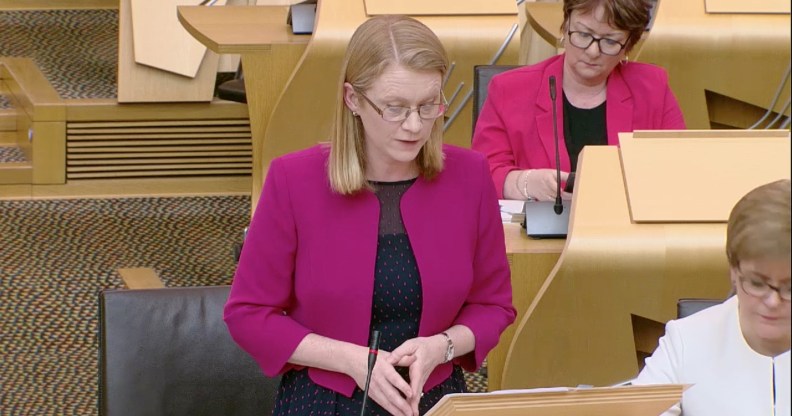Scotland “will not extend legal recognition to non-binary people”

SNP cabinet secretary Shirley-Anne Somerville. (Scottish Parliament TV)
Scotland “remains committed” to reforming the Gender Recognition Act but has delayed plans to bring in legislation, the Scottish Parliament heard today (June 20).
Instead of reforming the GRA, a draft bill containing proposed reforms will be published for another round of consultation later this year.
This draft bill will not extend legal recognition to non-binary people, as had been proposed in the last consultation – despite being backed by a majority of Scottish people.
Shirley-Anne Somerville, the SNP equalities secretary, read the statement at the Scottish Parliament.
Speaking to PinkNews, Somerville said, “We have not moved forward with legal recognition [for non-binary people], but I am determined to move forward with how we can help the non binary community.”
The proposed reforms do not include legal recognition of non-binary identities because “there are other avenues for that,” Somerville said.
“The consultation asked about what could be done in this area. One of those was legal recognition, but other aspects were consulted on,” Somerville said, adding that it was important to “listen to the wider debate.”
Somerville said in her statement to the Scottish Parliament that she intends to establish a working group to consider “possible changes to procedures and practice” regarding non-binary people.
She told PinkNews that it’s “very important that the working group hear from non-binary people and it’s important that that is taken into account, so people can have faith in what we are doing.”
The proposed reforms will remove the need for transgender people to provide medical evidence when seeking to change their legal gender, and reduce the amount of time trans people must live in their “acquired gender” before being able to legally change it from two years to six months.
But they will not fully de-medicalise the process, as campaigners had called for, and will not allow 16- and 17-year-olds to change their legal gender.
Somerville told the Scottish Parliament that the aim of the government is to ensure trans people enjoy equality and feel safe and accepted for who they are, but “in a way that doesn’t infringe on the rights of anyone else.”
“We welcome the Scottish Government’s move to create a working group to address non-legislative ways of recognising non-binary identities,” Colin Macfarlane, director of Stonewall Scotland, said.
“However, this needs to be backed up by a commitment to review the need for legal gender recognition. For non-binary people, not having any legal recognition means they are currently forced to identify as something they are not and this needs to change.”
Majority of public in Scotland support recognising non-binary people
The Scottish Government’s consultation on gender recognition was open from 9 November 2017 to 1 March 2018, receiving 15,697 responses.
A 62 percent majority said that Scotland should take action to legally recognise non-binary people.
Out of the options on what this action should be, 75 percent of respondents selected the option that would give full recognition to non-binary people using the proposed self-declaration system.
Feminism and trans rights
An Equality Impact Assessment will be published alongside the draft bill “to ensure that all rights are protected.”
“I am a feminist… I don’t feel a conflict between my support for women’s rights and for trans rights,” Somerville told the Scottish Parliament. “But I know and I understand that many do.”
“It’s important we listen to and address these concerns. These concerns are not about trans women. They are a fear of predatory men,” she said.
The draft bill is scheduled to be published by the end of 2019 and will be open to public consultation, despite the government having already carried out a consultation that showed the public favour reforming the GRA and recognising non-binary people.

